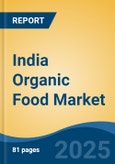Speak directly to the analyst to clarify any post sales queries you may have.
10% Free customizationThis report comes with 10% free customization, enabling you to add data that meets your specific business needs.
India ranks fifth globally in terms of land under organic cultivation, covering approximately 2.6 million hectares, which accounts for 1.5% of its total agricultural land. The country has also witnessed a significant 145.1% growth in land dedicated to organic farming over the past decade. With over 4.43 million organic farmers, India holds the largest number of organic producers in the world. The growing popularity of organic cereals, pulses, fruits, vegetables, dairy, and processed foods reflects a larger consumer shift toward safer, cleaner, and more sustainable food choices.
Key Market Drivers
Increasing Health Awareness and Wellness
Rising health consciousness is a primary force driving the growth of India’s organic food market. With growing concerns about the long-term health impacts of conventionally farmed food - often associated with chemical residues and artificial additives - consumers are turning to organic alternatives as safer and more nutritious options. Organic foods are increasingly seen as preventive health solutions that reduce exposure to harmful substances. This shift in mindset is not limited to metropolitan areas; rural communities are also recognizing the health and wellness benefits of organic consumption. As more individuals associate diet with well-being, the demand for clean-label, organic produce continues to gain momentum across demographics.Key Market Challenges
Lack of Awareness and Education
Despite growing demand, the Indian organic food sector faces persistent challenges related to limited consumer awareness and understanding. A large section of the population remains unaware of what defines organic food, its health benefits, or how it differs from conventional alternatives. Misconceptions around the authenticity and certification of organic products further impede market growth. The availability of credible information about organic farming methods, food labeling, and safety standards is still insufficient, particularly in non-metro areas. Addressing this gap through educational campaigns, community outreach, and transparent certification processes is essential to building consumer confidence and expanding the market’s reach.Key Market Trends
Increasing Consumer Awareness
A key trend influencing the organic food market in India is the rising consumer awareness of the health and environmental benefits of organic products. With growing concern over pesticide-laden produce and food safety issues, consumers are increasingly opting for organic alternatives believed to be more nutritious and chemical-free. The trend is gaining traction especially among health-conscious millennials, urban families, and educated consumers who are willing to invest in quality food. Greater media coverage, social media advocacy, endorsements by health professionals, and improved labeling have helped demystify organic food. As more consumers understand the connection between food, health, and sustainability, demand for certified organic products is accelerating, prompting farmers and retailers to expand organic offerings.Key Market Players
- Suminter India Organics Pvt. Ltd
- Nature Bio-Foods Limited
- Organic India Pvt. Ltd.
- Sresta Natural Bioproducts Pvt. Ltd.
- Nature Pearls Pvt Ltd
- Conscious Food Pvt Ltd
- Nourish Organic Foods Pvt Ltd
- EcoFarms (India) Limited
- Mehrotra Consumer Products Pvt. Ltd. (Organic Tattva)
- Morarka Organic Foods Limited
Report Scope:
In this report, the India Organic Food Market has been segmented into the following categories, in addition to the industry trends which have also been detailed below:India Organic Food Market, By Product Type:
- Organic Fruits and Vegetables
- Organic Beverages
- Organic Cereal & Pulses
- Organic Dairy Products
- Organic Herbs, Spices and Condiments
- Organic Flour
- Others
India Organic Food Market, By Distribution Channel:
- Departmental Stores
- Supermarket/Hypermarket
- Online
- Others
India Organic Food Market, By Region:
- North
- South
- East
- West
Competitive Landscape
Company Profiles: Detailed analysis of the major companies present in the India Organic Food Market.Available Customizations:
With the given market data, the publisher offers customizations according to a company's specific needs. The following customization options are available for the report.Company Information
- Detailed analysis and profiling of additional market players (up to five).
This product will be delivered within 1-3 business days.
Table of Contents
Companies Mentioned
- Suminter India Organics Pvt. Ltd.
- Nature Bio-Foods Limited
- Organic India Pvt. Ltd.
- Sresta Natural Bioproducts Pvt. Ltd.
- Nature Pearls Pvt Ltd
- Conscious Food Pvt Ltd
- Nourish Organic Foods Pvt Ltd
- EcoFarms (India) Limited
- Mehrotra Consumer Products Pvt. Ltd. (Organic Tattva)
- Morarka Organic Foods Limited
Table Information
| Report Attribute | Details |
|---|---|
| No. of Pages | 81 |
| Published | July 2025 |
| Forecast Period | 2025 - 2031 |
| Estimated Market Value ( USD | $ 1.79 billion |
| Forecasted Market Value ( USD | $ 3.21 Billion |
| Compound Annual Growth Rate | 10.2% |
| Regions Covered | India |
| No. of Companies Mentioned | 10 |









